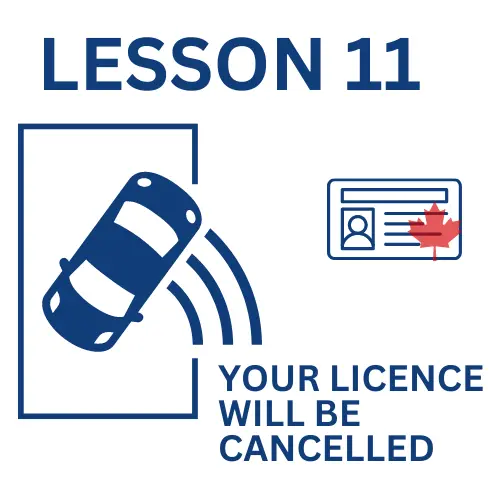In Canada, the cancellation of a driver’s license can occur under various circumstances, reflecting a commitment to road safety and responsible driving. Common reasons for license cancellation include serious traffic offenses like driving under the influence, reckless driving, and excessive speeding. Medical conditions or impairments that compromise a driver’s ability to operate a vehicle safely can also lead to license cancellation. Non-payment of fines, defaulting on court orders, and driving without insurance are additional factors that may prompt authorities to cancel a driver’s license.
Serious traffic offenses:
In Canada, committing serious traffic offenses is one of the most common causes of license cancellation. These offenses however, are not restricted to driving affected by liquor or medications, foolish driving or unnecessary speeding. The severity of the consequences, which may include an immediate license suspension or cancellation, often depends on the specific offense.
Weakened driving, specifically, is treated with most extreme reality. Canadian areas and domains have severe punishments for debilitated driving, going from fines and permit suspensions to detainment. At times, rehash offenses might prompt the super durable scratch-off of a driver’s permit, stressing the zero-resilience approach towards weakened driving.
Ailments and Impairments:
Permit scratch-off may happen on the off chance that a driver fosters an ailment or weakness that undermines their capacity to securely drive. Safety on the road is a top priority in Canada, and drivers are required to report any medical conditions that might make it hard for them to drive. Conditions like seizures, serious vision impedance, or certain psychological wellness issues might provoke permitting specialists to reconsider a singular’s wellness to drive.
Customary clinical evaluations are frequently expected for drivers with specific medical issue to guarantee that they can securely work a vehicle. Inability to agree with these evaluations or to uncover applicable clinical data might bring about permit scratch-off. However, if drivers can demonstrate that their condition is under control and does not pose a threat to road safety, they may be able to regain their licenses in some instances.
Non-Installment of Fines or Defaulting on Court Orders:
Licensing can be revoked for non-compliance with legal requirements, such as failing to pay fines or follow court orders regarding driving violations. Because it demonstrates a disregard for the legal responsibilities associated with driving, Canadian authorities take such noncompliance very seriously. Drivers are supposed to satisfy any monetary commitments forced by the courts quickly, and inability to do so may bring about regulatory activities against their licenses.
Drivers need to be aware of any outstanding court orders or fines and act promptly to address them. Disregarding these commitments seriously jeopardizes a driver’s permit as well as heighten legitimate results.
Extreme Negative mark Points:
Most Canadian regions and domains utilize a negative mark guides framework toward track and punish criminal traffic offenses. Collecting extreme fault focuses inside a particular time span can prompt permit suspension or crossing out. The quantity of focuses appointed for every offense shifts, and more serious infringement convey higher point punishments.
Demerit points may be accrued by drivers who regularly engage in risky driving practices. In such cases, permitting specialists might make remedial moves, including permit suspension or scratch-off, to guarantee that the driver’s way of behaving lines up with the principles of street security.
Driving Without Insurance:
In Canada, driving without protection is a serious offense that can bring about permit dropping. It is required by law for drivers to have adequate insurance, and they are expected to keep current coverage at all times. In the event that a driver is gotten without insurance or neglects to recharge their contract, their permit might be suspended or dropped.
Driving without protection not just imperils the monetary prosperity of the driver yet additionally represents a huge gamble to other street clients. The scratch-off of a permit in such cases highlights the significance of dependable and reputable conduct on the streets.
Graduated Authorizing Violations:
Numerous areas in Canada have carried out graduated authorizing frameworks, which step by step acquaint new drivers with additional perplexing driving situations. Infringement of the limitations forced by these frameworks can bring about permit scratch-off. For instance, new drivers are much of the time subject to constraints on the quantity of travelers they can convey, limitations on driving during explicit hours, and a zero-resistance strategy for liquor utilization.
Penalties, including the loss of a license, may result from violating these graduated licensing restrictions. It is vital for new drivers to look into the guidelines of their particular graduated permitting frameworks and guarantee severe consistence to stay away from antagonistic outcomes.
Conclusion about license cancellation:
In conclusion, in order to keep a driver’s license in good standing in Canada, one must strictly adhere to traffic laws, drive safely, and follow all medical and legal requirements. Permit crossing out is certainly not a corrective measure yet rather a defensive component to guarantee street wellbeing and maintain the standards of mindful driving. Understanding the conditions that might prompt permit dropping is fundamental for all drivers, underlining the requirement for consistent mindfulness, consistence, and a guarantee to protected and dependable driving practices. In the end, drivers can help make the road environment safer and more secure for themselves and others by understanding the consequences of their actions.

